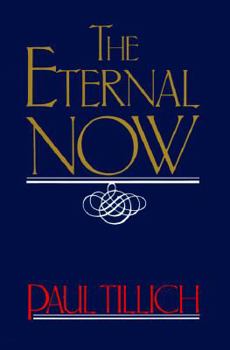The Eternal Now
Select Format
Select Condition 
Book Overview
These 16 sermons contain in concentrated form some of Tillich's most lambent themes. Although they were first published in the early 1960s, the pieces in question take up preoccupations which continue... This description may be from another edition of this product.
Format:Paperback
Language:English
ISBN:068471907X
ISBN13:9780684719078
Release Date:January 1963
Publisher:Scribner Book Company
Length:185 Pages
Weight:0.56 lbs.
Dimensions:0.6" x 5.4" x 8.0"
Customer Reviews
3 ratings
THE THIRD (AND FINAL) COLLECTION OF SERMONS FROM A MAJOR 20TH CENTURY THEOLOGIAN
Published by Thriftbooks.com User , 14 years ago
Paul Tillich (1886-1965) was a German-American theologian and Christian existentialist philosopher. He published three volumes of his sermons (many given at chapel at Union Theological Seminary), of which this is the third, preceded by The Shaking of The Foundations and The New Being. He indicates in the Preface, "I would have chosen 'The Spiritual Presence' as the general title, but the many unfavorable connotations with which the word 'Spiritual' is burdened excluded this possibility." Here are some representative quotations: "(I)f history should end tomorrow, through mankind's self-annihilation, the appearance of this planet and of man upon it will NOT have been in vain. For a being shall have appeared at least once ... toward whose creation all the forces of life on earth worked together, and in whom the image of of the divine Ground of all life was present." "(E)ternal life is not continuation of life after death. Eternal life is beyond past, present, and future... it is the divine life in which we are rooted and in which we are destined to participate in freedom---for God alone has eternity." "And if we call Jesus, the Christ, our saviour, then we mean that in him we see the power which heals us by accepting us and which liberates us by showing us in his being a new being---a being in which there is reconciliation with ourselves, with our world, and with the divine Ground of our world and ourselves." The psychologist Rollo May wrote a sympathetic biography of him (Paulus), and Tillich's wife Hannah wrote a less-friendly account (From Time to Time). His major work is his three-volume Systematic Theology, vol. 1, Systematic Theology, vol. 2: Existence and the Christ, and Systematic Theology, vol. 3: Life and the Spirit: History and the Kingdom of God.
Recognizing the reality of doubt
Published by Thriftbooks.com User , 24 years ago
Tillich recognizes the human condition and the frailties of human existence. In the first 6 sermons on "the human predicament", he discusses such paradoxical human conditions as loneliness and solitude, forgetting and being forgotten, and "The good that I will, I do not". "The divine reality" section contains sermons on the harder aspects of Christianity, that no one can say with certainty that they are participating in the new reality, the Holy Spirit, and that the flight from God begins the moment we feel His presence. Tillich recognizes the reality of doubt, for if we could possess Him like any other familiar work, God would not be God (and perhaps if we do not have doubts, we are limiting Him too much!). Throughout the book, Tillich recognizes the message of "divine foolishness" (his phrase), and the role of the Holy in wisdom and meaning. These are thought provoking sermons, particularly for those of an existentialist bent.
A very capable introduction to Tillich's perspective.
Published by Thriftbooks.com User , 25 years ago
Enegetic and simple, The Eternal Now is a very accessible introduction to the multi-faceted theology of Paul Tillich. Throughout this collection of sermons, Tillich emphasizes the connection between the temporal and eternal (a strength of his writing in general). And, this emphasis is achieved with a light hand, Tillich repeatedly walks the reader calmly towards the realization of how much can still be accomplished by the individual, what courage he or she can still gain -- how much, all of us, are still rooted "in divine ground." Tillich speaks from a Christian perspective, but his wisdom is non-denominational. His is a theology even for the stoutest critic, because as Tillich alludes to in the following passage from The Eternal Now, cynic and priest can ask similar questions from a similar conidition: "There are many ways in which solitude can be sought and experienced. And each way can be called 'religious,' . . . as one philosopher said . . . 'religion is what a man does with his solitariness.'" Emphasizing that such things as eternal questions and Love do not belong to a specific religion or era, Tillich's work speaks to, and beyond, our time and culture. He demands such a flexibility of perspective from us as humans. This is the legacy and promise Tillich offers, and The Eternal Now is a very capable introduction to it.






